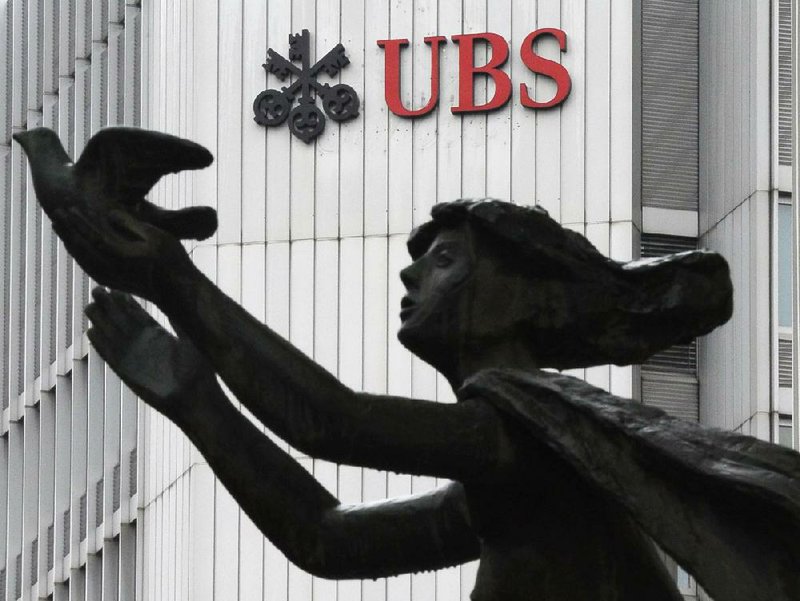GENEVA — Swiss bank UBS agreed Wednesday to pay $1.5 billion in fines for attempting to manipulate a key interest rate that affects borrowers around the world.
The settlement with U.S., British and Swiss regulators caps a tough year for the company and the reputation of the global banking industry. The fine on UBS, which will also see two former traders charged with conspiracy, is triple the amount that British bank Barclays PLC agreed to pay in June to settle similar charges.
And it comes a week after bank HSBC agreed to pay nearly $2 billion to settle allegations of laundering money for Mexican drug cartels and countries under U.S. embargoes, such as Iran.
UBS, Switzerland’s largest bank, said some of its employees tried to rig the Libor - short for London Interbank Offered Rate - in several currencies. The rate is set daily using information that banks provide and is used to price trillions of dollars in contracts around the world, including mortgages and credit cards.
Some UBS traders voluntarily submitted - or pressured others to submit - inaccurate data to gain some financial advantage.
The bank’s Japan unit, where much of the manipulation took place, entered a plea to one count of wire fraud in an agreement with the U.S. Justice Department.
The Justice Department said two former UBS senior traders - Tom Alexander William Hayes, 33, of Britain, and Roger Darin, 41, of Switzerland - will be charged with conspiracy, and Hayes also will be charged with wire fraud in New York federal court. Justice Department officials said they believed that the two men were in Britain and Switzerland, and would be seeking their extradition.
UBS will pay $1.2 billion of its fine to the Justice Department and the U.S. Commodity Futures Trading Commission. The commission will get $700 million, the largest fine it ever ordered. The remaining $300 million will go to regulators in Britain and Switzerland.
As a result of the fines, litigation, unwinding of real-estate investments, restructuring and other costs, UBS said it expects to lose between $2.2 billion to $2.7 billion in the fourth quarter. Nevertheless, the Zurich-based bank maintained that it “remains one of the best capitalized banks in the world.”
UBS shares closed down 0.3 percent at $16.67 on the Zurich exchange.
The Libor scandal is likely to make headlines again in coming months. Other big global banks are also being investigated for rigging the same market and are expected to be fined.
UBS said some of its personnel had “engaged in efforts to manipulate submissions for certain benchmark rates to benefit trading positions” and that some employees had “colluded with employees at other banks and cash brokers to influence certain benchmark rates to benefit their trading positions.”
Britain’s financial regulator called the misconduct by UBS “extensive and broad,” with the rate fixing carried out from UBS offices in London and Zurich.
Different desks were responsible for different rate submissions. At least 2,000 requests for inappropriate submissions were documented. An unquantifiable number of oral requests were also made, the U.K.’s Financial Services Authority said.
“Manipulation was also discussed in internal open chat forums and g roup e-mails, and was widely known,” the authority said. “At least 45 individuals including traders, managers and senior managers were involved in or aware of the practice of attempting to influence submissions.”
Joe Rundle, head of trading at London-based ETX Capital, said the case exposes “just how brazen and arrogant” the UBS traders were while collaborating with “corrupt external brokers.”
Sergio Ermotti, who was appointed chief executive officer of UBS in November2011, said the misconduct does not reflect the bank’s values or standards.
In an interview with Swiss TV, Ermotti said the bank fired 36 employees involved in the scandal over the past 18 months and learned some clear lessons from it - mainly that “we had to strengthen our controls.”
“We are on our way to finding solutions to some of the problems,” he told the German-speaking public broadcaster SRF. “We have to recognize our failures and learn from them, but also look ahead.”
With more than $2.4 trillion in invested assets, UBS is one of the world’s largest managers of private-wealth assets. At last count, the bank had 63,745 employees in 57 countries and said it aims for a head count of 54,000 in 2015.
Along with Credit Suisse, the second-largest Swiss bank, UBS is on the list of the 29 “global systemically important banks” that the Bank for International Settlements - the central bank for central banks - considers too big to fail.
It’s not the first time that UBS has fallen afoul of regulators. In 2009, U.S. authorities fined UBS $780 million for helping U.S. citizens avoid paying taxes.
The U.S. government has since been pushing Switzerland to loosen its rules on banking secrecy. The country has been trying to shed its image as a tax haven, signing deals with the U.S., Germany and Britain to provide greater assistance to foreign tax authorities seeking information on their citizens’ accounts.
Ermotti has called Switzerland’s tax disputes with the U.S. and some European nations “an economic war” putting thousands of jobs at risk.
In September 2011, UBS revealed that unauthorized trades in London by a 32-year-old employee, Kweku Adoboli, had cost it more than $2 billion, the biggest ever fraud at a bank in Britain.
Britain’s financial regulator fined UBS, saying its internal controls were inadequate to prevent Adoboli, a relatively inexperienced trader, from making vast and risky bets. Adoboli has been sentenced to seven years in prison.
Business, Pages 25 on 12/20/2012

